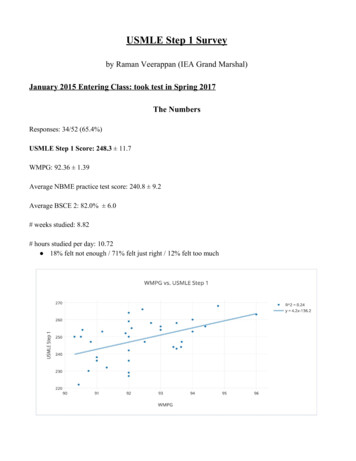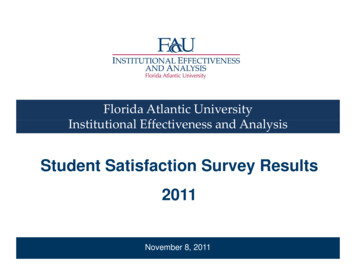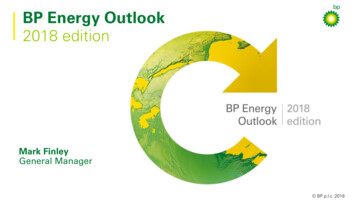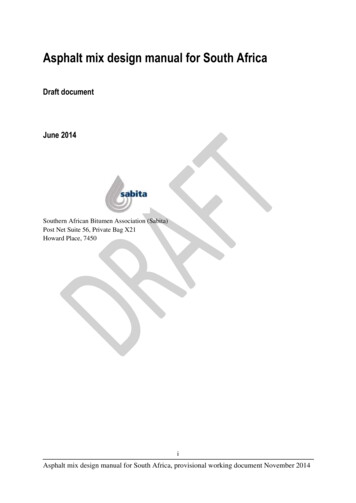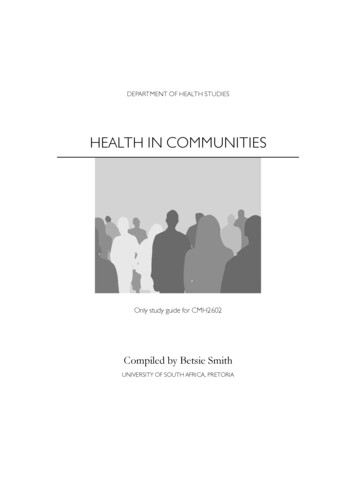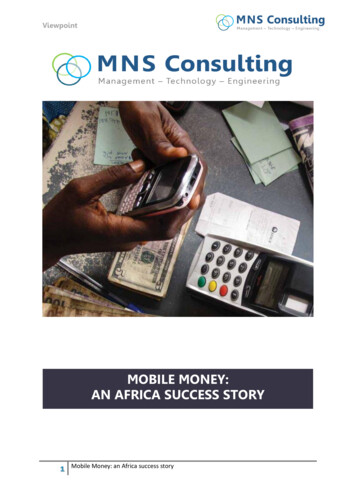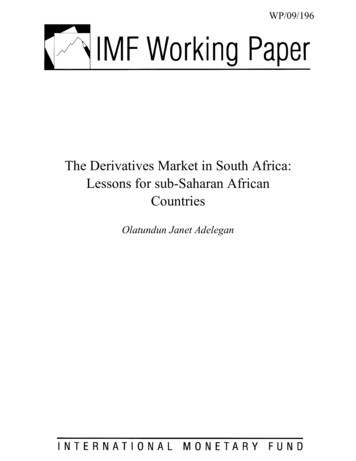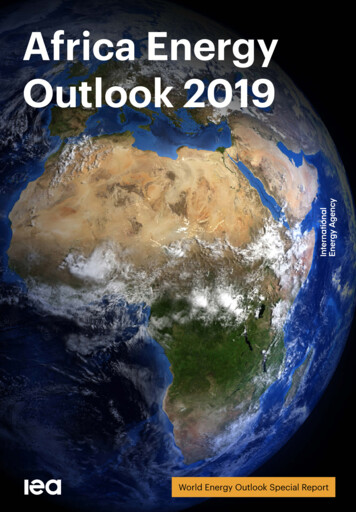
Transcription
Africa EnergyOutlook 2019World Energy Outlook Special Report
Africa EnergyOutlook 2019www.iea.org/africa2019World Energy Outlook Special ReportAfrica Energy Outlook - Cover Layout.indd 431-10-2019 17:09:18
INTERNATIONAL ENERGYAGENCYThe IEA examinesthe full spectrumof energy issuesincluding oil, gasand coal supply anddemand, renewableenergy technologies,electricity markets,energy efficiency,access to energy,demand sidemanagement andmuch more. Throughits work, the IEAadvocates policiesthat will enhancethe reliability,affordability andsustainability ofenergy in its 30member countries,8 associationcountries andbeyond.Please note that thispublication is subject tospecific restrictions that limitits use and distribution. Theterms and conditions areavailable online atwww.iea.org/t&c/Source: IEA. All rightsreserved.International Energy AgencyWebsite: www.iea.orgClassic Page 1.indd 1Classic Page 1 A4.indd 1IEA membercountries:AustraliaAustriaBelgiumCanadaCzech andsNew ZealandNorwayPolandPortugalSlovak RepublicSpainSwedenSwitzerlandTurkeyUnited KingdomUnited nesiaMoroccoSingaporeSouth AfricaThailandThe EuropeanCommission alsoparticipates in thework of the IEA21-10-2019 10:53:4121-10-2019 10:55:38
ForewordAs Africa’s population rapidly expands and urbanises, its need for reliable and sustainableenergy supply will become greater than ever. This energy is needed not only to drive thecontinent’s economic development but also to provide modern energy services to the largenumbers of Africans currently living without them. Africa is set to emerge as a key driver ofglobal energy demand growth, one that is home to abundant reserves of fossil fuels, solarpower and minerals that will be vital for clean energy transitions worldwide. And eventhough Africa has produced just 2% of global energy-related carbon dioxide (CO₂)emissions, the continent is disproportionately on the front line when it comes to the effectsof the world’s changing climate.The International Energy Agency (IEA) has long paid close attention to Africa’s energysector. We have been working on energy access issues on the continent for nearly twodecades, notably through our pioneering analysis in the World Energy Outlook series. Thisnew special report is significant in its unrivalled breadth and depth, with a particularlygranular focus on sub-Saharan countries.Africa’s growing urban populations will require ever more energy to power industrialproduction, air conditioning and expanding use of transport. In our Stated Policies Scenario,based on current and announced policies, African energy demand grows twice as fast asthe global average over the next two decades. That includes an additional 500 millionpeople who are expected to live in areas requiring some form of cooling. Despite a shift tomodern and more efficient energy sources over this period, the continent’s current policysettings aren’t enough to put it on track to meet its development needs and providereliable and modern energy services for all.IEA. All rights reserved.Effective energy policy choices are essential to deliver Africa’s inclusive growth ambitions(such as those contained in the region’s Agenda 2063 strategic framework), and to helpmeet other major sustainable energy and development goals. This is why we introduce theAfrica Case in this report, a new scenario built around Africa’s own vision for its future. Itincorporates the policies needed to develop the continent’s energy sector in a way thatallows economies to grow strongly, sustainably and inclusively. Doing so does not meanAfrican economies have to become ever more energy intensive. Africa stands on the cuspof a unique opportunity: the possibility of becoming the first continent to develop itseconomy primarily by using energy efficiency, renewables and natural gas – all of whichoffer huge untapped potential and economic benefits.For example, Africa has the richest solar resources on the planet, but has installed only5 gigawatts of solar photovoltaics (PV), accounting for less than 1% of global capacity. Withthe right policies, solar could become one of the continent’s top energy sources. Naturalgas, meanwhile, is likely to correspond well with Africa’s industrial growth drive and needfor reliable electricity supply. Today, the share of gas in sub-Saharan Africa’s energy mix isamong the lowest in the world. But that could be about to change, especially consideringthe supplies the continent has at its disposal: it is home to more than 40% of global gasForeword3
discoveries so far this decade. Africa’s rich natural resources aren’t limited to sunshineand other energy sources. Its major reserves of minerals such as cobalt and platinumthat are crucial for clean energy technologies mean the continent holds the keyingredients for global energy transitions.This Africa Energy Outlook contains quantitative analysis of important factors influencingenergy development in Africa. This includes detailed modelling of 11 sub-Saharan countriesthat enabled us to produce comprehensive, data-rich profiles from which we extractedimportant implications for Africa and the world. The profiles are a notable highlight of thereport, providing a much greater level of detail than any other analysis of energy in Africa.This report comes at an important time in the IEA’s deepening engagement with Africa. Itreflects the continent’s increasing role in global energy affairs and the strengtheningrelationships between African energy decision makers and the IEA. South Africa andMorocco are now part of the IEA family. In May 2018, the IEA and the African UnionCommission co-hosted their first joint ministerial summit at which African UnionCommissioner Dr Amani Abou-Zeid and I signed a strategic Memorandum of Understandingto guide the two organisations’ future collaborations. A second ministerial forum will beheld in 2020.I hope this new report serves as both an anchor for our new programme of work withAfrican countries and also as a means to guide the continent towards a more secure andsustainable energy future.IEA. All rights reserved.Dr. Fatih BirolExecutive DirectorInternational Energy Agency4Africa Energy Outlook 2019 Special Report
AcknowledgementsThis study was prepared by the World Energy Outlook (WEO) team in the Directorate ofSustainability, Technology and Outlooks (STO) in co-operation with other directorates andoffices of the International Energy Agency. The study was designed and directed byLaura Cozzi, Chief Energy Modeller. Stéphanie Bouckaert, Tae-Yoon Kim, andKieran McNamara were the principal authors. Tim Gould, Head of Division for EnergySupply and Investment Outlooks, provided essential guidance.The other main authors were: Lucila Arboleya Sarazola (investment), Yasmine Arsalane(power), Arthur Contejean (energy access), Timothy Goodson (electricity demand andbuildings) and Molly A. Walton (resource management).Other key contributors were: Thibaut Abergel (cities), Zakia Adam (country profiles, datamanagement), Ali Al-Saffar (urbanisation and industrialisation), Bipasha Baruah (gender),Michela Cappannelli (biogas), Haoua Cisse Coulibaly (policies), Davide D’Ambrosio(country profiles, data management and visualisations), Amrita Dasgupta (transport),Chiara Delmastro (cooling), Marina Dos Santos (policies), John Dulac (cooling), Jinsun Lim(climate impact on hydro), Luis Munuera (visualisation), Paweł Olejarnik (supplymodelling), Apostolos Petropoulos (transport), Andrew Prag (climate impact on hydro),Arnaud Rouget (energy access), Marcela Ruiz De Chavez Velez (industry),Andreas Schröder (industry) and Wilfred Yu (power). The study also relied on support fromacross the entire WEO team. Teresa Coon and Eleni Tsoukala provided essential support.Edmund Hosker carried editorial responsibility. Debra Justus was the copy-editor.The IEA is especially grateful to H.E. Dr. Kandeh Yumkella for valuable input and guidancethroughout the project.Mechthild Wörsdörfer, Director of STO, provided guidance throughout the project.Valuable comments and feedback were provided by other senior management andnumerous other colleagues within the IEA. In particular, Paul Simons, Nick Johnstone,Laszlo Varro, Peter Fraser, Brian Motherway, Rebecca Gaghen, Alessandro Blasi and JoelCouse.IEA. All rights reserved.Thanks go to the IEA’s Communication and Digitalisation Office for their help in producingthe report and website materials, particularly to Jad Mouawad, Jethro Mullen, AstridDumond, Jon Custer, Christopher Gully, Isabelle Nonain Semelin and Sabrina Tan. DianaBrowne and Ivo Letra provided essential support to the production process. IEA’s Office ofthe Legal Counsel, Office of Management and Administration and Energy Data Centreprovided assistance throughout the preparation of the report. Uğur Öcal and RyszardPośpiech also provided support.Valuable input to the analysis was provided by David Wilkinson (independent consultant),Emmanouil Christinakis (independent consultant), Dr. Andriannah Mbandi (StockholmEnvironment Institute), Jacqueline Senyagwa (University of Cape Town), Andreas Sahlberg,Babak Khavari, Alexandros Korkovelos and Mark Howells (KTH Swedish Royal Institute ofAcknowledgements5
Technology), Jose Ignacio Perez-Arriaga, Fernando de Cuadra-García, Andrés GonzálezGarcía and Pedro Ciller-Cutillas (MIT-Comillas Universal Energy Access Lab), Markus Amann,Peter Rafaj, Gregor Kiesewetter, Wolfgang Schöpp, Chris Heyes, Zbigniew Klimont, JensBorken-Kleefeld and Pallav Purohit (International Institute for Applied Systems Analysis).The work could not have been achieved without the support and co-operation provided bymany government bodies, organisations and companies worldwide, notably: Eni; EuropeanCommission; Ministry of Economic Affairs and Climate Policy, Netherlands; Ministry ofEconomy, Trade and Industry, Japan; and Schneider Electric. Activities within the IEA CleanEnergy Technologies Programme provided valuable support to this report.A high-level workshop on the Africa Energy Outlook, was held in Paris on 17 April 2019. Theparticipants offered valuable new insights, feedback and data for this analysis.Further details on these events are available at www.iea.org/weo/events.Many senior government officials and international experts provided input and reviewedpreliminary drafts of the report. Their comments and suggestions were of great value. Theyinclude:Thomas A. FrankiewiczAmani Abou-ZeidOlalekan David AdeniyiIEA. All rights reserved.Wisdom Ahiataku-TogoboSafiatou Alzouma NouhouPedro AntmannEdi AssoumouDouglas K BagumaDavid BénazérafChakib BenmoussaChristian BessonAndré Kabwe BibombeRina Bohla ZellerEdward BorgsteinWilliam BrentIrene Calvé SaboritUte CollierEmanuela ColomboAnne-Sophie CorbeauJon Lezamiz CortazarChristian de GromardJoseph Essandoh-YedduCapella Festa6US Environmental Protection Agency (EPA)African Union Commission, EthiopiaChemical Engineering Department, Federal University ofTechnology, NigeriaMinistry of Energy, GhanaAfrica Renewable Energy Initiative (AREI)World BankMines ParisTech, FranceInnovex, UgandaSahel and West Africa Club (SWAC), OECDKingdom of MoroccoIndependent consultantEnergy Commission, DR CongoVestas, DenmarkRocky Mountain Institute, Sustainable Energy for EconomicDevelopment (SEED) program (AFRICA)Power for AllSunkofa EnergyPractical ActionPolitecnico di Milano, ItalyBPSiemens GamesaAgence Française de Développement (AFD), FranceEnergy Commission, GhanaSchlumbergerAfrica Energy Outlook 2019 Special Report
Silvia FranciosoMike FulwoodPeter GeorgeOlivia GippnerKazushige GobeMonica GullbergAndrew HerscowitzMartin HillerKamiishi HirotoNastassja HoffetDona Jean-Claude HoussouSamuel IgbatayoEmmanuel K. AckomIEA. All rights reserved.Talla KebeDaniel KetotoChristoph KostKen KoyamaFrancesco La CameraGlada LahnPer LandbergRichard LavergneDavid LecoqueNikolaj Lomholt SvenssonEmadeldin Ahmed MahgoubMolka MajdoubMouhamadou MakhtarSenatla MamahlokoMartin HaighAnne Marx LorenzenAtef MarzoukDimitris MentisMichelle Michot FossAsami MiketaArthur MinsatSimone MoriIsabel MurrayRose MutisoGlory OguegbuAcknowledgementsGOGLANexantClean Cooking AllianceDG Climate Action, European CommissionJapan Bank For International Cooperation (JBIC)Swedish International Development Cooperation Agency(SIDA)Power Africa, US Agency for International DevelopmentRenewable Energy and Energy Efficiency Partnership(REEEP)Japan International Cooperation Agency (JICA)Ministère de l’Europe et des Affaires Etrangères, FranceMinistry of Energy, BeninAfe Babalola University, NigeriaUN Environment Programme (UNEP), Technical Universityof Denmark Partnership (DTU)United Nations, Office of The Special Advisor On AfricaGovernment of Kenya/Office of the PresidentInstitute for Transportation & Development Policy (ITDP)Institute of Energy Economics, JapanInternational Renewable Energy AgencyChatham HouseNorwegian Agency for Development Cooperation (NORAD)Ministry for Economy and Finance, FranceAlliance for Rural ElectrificationEmbassy of Denmark in EthiopiaAgricultural Research Corporation (ARC), SudanAfrican Development BankMinistère du pétrole et des énergies, SenegalCouncil for Scientific and Industrial Research (CSIR), SouthAfricaShellDanish Ministry of Climate, Energy and UtilitiesAfrican Union CommissionWorld Resources Institute (WRI), United StatesUniversity of TexasInternational Renewable Energy AgencyOrganisation for Economic Co-operation and DevelopmentENELDepartment of Natural Resources, CanadaEnergy for Growth HubRenewable Energy Technology Training Institute (RETTI)7
Karin OhlenforstSheila OparaochaMoussa OusmanIsaiah OwiunjiCathy OxbyPak YongdukJose Ignacio Perez ArriagaLapo PistelliJem PorcaroElisa PortaleSeth RobertsAmir SadeghiPapa Samba BaThomas ScurfieldCarsten StaurJessica StephensRobert StonerDinesh SurroopMinoru Taka
numbers of Africans currently living without them. Africa is set to emerge as a key driver of global energy demand growth, one that is home to abundant reserves of fossil fuels, solar power and minerals that will be vital for clean energy transitions worldwide. And even though Africa has produced just 2% of global energy-related carbon dioxide (CO₂) emissions, the continent is .
